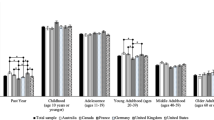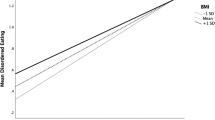Abstract
Background
Perceived weight discrimination is associated with increased risk for chronic diseases and reduced life expectancy. Nevertheless, little is known about perceived weight discrimination in racial, ethnic, and sexual minority groups or in individuals at the intersections of those groups. The goal of this study was to identify sociodemographic predictors of perceived weight discrimination.
Subjects/Methods
A diverse sample of adults (37% Black/African American, 36% Latino, 29% sexual minority) with a body mass index (BMI) ≥ 18.5 kg/m2 were recruited from a national US panel to complete an online survey (N = 2454). Perceived weight discrimination was assessed with the Stigmatizing Situations Survey-Brief (SSI-B). Using hierarchical linear regression analysis, SSI-B scores were predicted from the four sociodemographic characteristics of interest (gender, race, ethnicity, and sexual orientation) while controlling for BMI, age, education, and income (Step 1). At Step 2, all two-way interactions between the four sociodemographic characteristics were added to the model.
Results
At Step 1, higher SSI-B scores were observed for Latino (vs. non-Latino) adults, sexual minority (vs. heterosexual) adults, younger (vs. older) adults, adults with higher (vs. lower) levels of education, and adults with higher (vs. lower) BMI. At Step 2, race interacted with gender, ethnicity, and sexual orientation to predict SSI-B scores such that relatively higher scores were observed for non-Black women, Black men, adults who identified as Black and Latino, and non-Black sexual minority adults.
Conclusions
Perceived weight discrimination varied across sociodemographic groups, with some subgroups reporting relatively high frequency. Black race appeared to be protective for some subgroups (e.g., Black women), but risk-enhancing for others (e.g., Black men, individuals who identified as Black and Latino). Additional research is needed to identify specific factors that cause certain sociodemographic groups –and indeed, certain individuals—to perceive higher levels of weight discrimination than others.
This is a preview of subscription content, access via your institution
Access options
Subscribe to this journal
Receive 12 print issues and online access
$259.00 per year
only $21.58 per issue
Buy this article
- Purchase on Springer Link
- Instant access to full article PDF
Prices may be subject to local taxes which are calculated during checkout



Similar content being viewed by others
Data availability
The dataset analyzed during the current study along with the analytic code and materials are available in the Open Science Framework: https://osf.io/5qsjc/?view_only=9bd700f8afea47cf8cf7ca1cc13574b1.
References
Hales CM, Carroll MD, Fryar CD, Ogden CL. Prevalence of obesity and severe obesity among adults: United States, 2017-2018. NCHS Data Brief. 2020;360:1–8.
Charlesworth TES, Banaji MR. Patterns of implicit and explicit attitudes: I. Long-term change and stability from 2007 to 2016. Psychol Sci. 2019;30:174–92.
Puhl RM, Heuer CA. The stigma of obesity: a review and update. Obesity. 2009;17:941–64.
Puhl R, Brownell KD. Bias, discrimination, and obesity. Obes Res. 2001;9:788–805.
Puhl RM, Himmelstein MS, Pearl RL. Weight stigma as a psychosocial contributor to obesity. Am Psychol. 2020;75:274–89.
Spahlholz J, Baer N, Konig HH, Riedel-Heller SG, Luck-Sikorski C. Obesity and discrimination - A systematic review and meta-analysis of observational studies. Obes Rev. 2016;17:43–55.
Brewis A, SturtzSreetharan C, Wutich A. Obesity stigma as a globalizing health challenge. Glob Health. 2018;14:20.
Puhl RM, Lessard LM, Himmelstein MS, Foster GD. The roles of experienced and internalized weight stigma in healthcare experiences: Perspectives of adults engaged in weight management across six countries. Plos One. 2021;16:e0251566.
Carr D, Friedman MA. Is obesity stigmatizing? Body weight, perceived discrimination, and psychological well-being in the United States. J Health Soc Behav. 2005;46:244–59.
Griffiths S, Brennan L, O’Gorman B, Goedel WC, Sheffield J, Bastian B, et al. Experiences of weightism among sexual minority men: Relationships with Body Mass Index, body dissatisfaction, and psychological quality of life. Soc Sci Med. 2018;214:35–40.
Prunty A, Clark MK, Hahn A, Edmonds S, O’Shea A. Enacted weight stigma and weight self stigma prevalence among 3821 adults. Obes Res Clin Pr. 2020;14:421–7.
Sutin AR, Terracciano A. Sources of weight discrimination and health. Stigma Health. 2017;2:23–7.
Myers A, Rosen JC. Obesity stigmatization and coping: relation to mental health symptoms, body image, and self-esteem. Int J Obes Relat Metab Disord. 1999;23:221–30.
Pearl RL. Weight bias and stigma: public health implications and structural solutions. Soc Iss Policy Rev. 2018;12:146–82.
Gerend MA, Patel S, Ott N, Wetzel K, Sutin AR, Terracciano A, et al. A qualitative analysis of people’s experiences with weight-based discrimination. Psychol Health. 2022;37:1093–110.
Hatzenbuehler ML, Nolen-Hoeksema S, Dovidio J. How does stigma “get under the skin”?: The mediating role of emotion regulation. Psychol Sci. 2009;20:1282–9.
Major B, Tomiyama AJ, Hunger J. The negative and bidirectional effects of weight stigma on health. In: Major B, Dovidio JF, Link BG, editors. The Oxford Handbook of Stigma, Discrimination, and Health. New York: Oxford University Press; 2018. p. 499–520.
Pascoe EA, Richman LS. Perceived discrimination and health: A meta-analytic review. Psychol Bull. 2009;135:531–54.
Tomiyama AJ. Weight stigma is stressful. a review of evidence for the Cyclic Obesity/Weight-Based Stigma model. Appetite. 2014;82:8–15.
Williams DR, Mohammed SA. Discrimination and racial disparities in health: Evidence and needed research. J Behav Med. 2009;32:20–47.
Adil O, Kuk JL, Ardern CI. Associations between weight discrimination and metabolic health: A cross sectional analysis of middle aged adults. Obes Res Clin Pr. 2022;16:151–7.
Sutin AR, Stephan Y, Luchetti M, Terracciano A. Perceived weight discrimination and C-reactive protein. Obesity. 2014;22:1959–61.
Udo T, Purcell K, Grilo CM. Perceived weight discrimination and chronic medical conditions in adults with overweight and obesity. Int J Clin Pr. 2016;70:1003–11.
Vadiveloo M, Mattei J. Perceived weight discrimination and 10-year risk of allostatic load among US adults. Ann Behav Med. 2017;51:94–104.
Sutin AR, Terracciano A. Perceived weight discrimination and obesity. Plos One. 2013;8:e70048.
Sutin AR, Stephan Y, Robinson E, Daly M, Terracciano A. Perceived weight discrimination and risk of incident dementia. Int J Obes. 2019;43:1130–4.
Prunty A, Hahn A, O’Shea A, Edmonds S, Clark MK. Associations among enacted weight stigma, weight self-stigma, and multiple physical health outcomes, healthcare utilization, and selected health behaviors. Int J Obes. 2023;47:33–8.
Sutin AR, Stephan Y, Terracciano A. Weight discrimination and risk of mortality. Psychol Sci. 2015;26:1803–11.
Dutton GR, Lewis TT, Durant N, Halanych J, Kiefe CI, Sidney S, et al. Perceived weight discrimination in the CARDIA study: differences by race, sex, and weight status. Obesity. 2014;22:530–6.
Himmelstein MS, Puhl RM, Quinn DM. Intersectionality: an understudied framework for addressing weight stigma. Am J Prev Med. 2017;53:421–31.
Puhl RM, Andreyeva T, Brownell KD. Perceptions of weight discrimination: prevalence and comparison to race and gender discrimination in America. Int J Obesity. 2008;32:992–1000.
Wellman JD, Araiza AM. Examining the impact of perceived weight discrimination on reported eating and exercise among White and Latino/a adults. Eat Behav. 2021;42:101529.
Puhl RM, Himmelstein MS, Pearl RL, Wojtanowski AC, Foster GD. Weight stigma among sexual minority adults: findings from a matched sample of adults engaged in weight management. Obesity. 2019;27:1906–15.
Austen E, Greenaway KH, Griffiths S. Differences in weight stigma between gay, bisexual, and heterosexual men. Body Image. 2020;35:30–40.
Shonrock AT, Miller JC, Byrd R, Sall KE, Jansen E, Carraway M, et al. Experienced weight stigma, internalized weight bias, and maladaptive eating patterns among heterosexual and sexual minority individuals. Eat Weight Disord. 2022;27:3487–97.
Vartanian LR. Development and validation of a brief version of the Stigmatizing Situations Inventory. Obes Sci Pr. 2015;1:119–25.
Puhl RM, Brownell KD. Confronting and coping with weight stigma: an investigation of overweight and obese adults. Obesity. 2006;14:1802–15.
Krieger N, Smith K, Naishadham D, Hartman C, Barbeau EM. Experiences of discrimination: validity and reliability of a self-report measure for population health research on racism and health. Soc Sci Med. 2005;61:1576–96.
Dorsey RR, Eberhardt MS, Ogden CL. Racial/ethnic differences in weight perception. Obesity. 2009;17:790–5.
Grabe S, Hyde JS. Ethnicity and body dissatisfaction among women in the United States: a meta-analysis. Psychol Bull. 2006;132:622–40.
Caprio S, Daniels SR, Drewnowski A, Kaufman FR, Palinkas LA, Rosenbloom AL, et al. Influence of race, ethnicity, and culture on childhood obesity: implications for prevention and treatment. Obesity. 2008;16:2566–77.
Spinner JR. An examination of the impact of social and cultural traditions contributing to overweight and obesity among Black women. J Prim Care Community Health. 2022;13:21501319221098519.
Swami V. Cultural influences on body size ideals: Unpacking the impact of westernization and modernization. Eur Psychol. 2015;20:44–51.
Downey G, Feldman SI. Implications of rejection sensitivity for intimate relationships. J Pers Soc Psychol. 1996;70:1327–43.
Gao S, Assink M, Cipriani A, Lin K. Associations between rejection sensitivity and mental health outcomes: A meta-analytic review. Clin Psychol Rev. 2017;57:59–74.
Landrine H, Klonoff EA. The schedule of racist events: A measure of racial discrimination and a study of its negative physical and mental health consequenes. J Black Psychol. 1996;22:144–68.
U.S. Department of Health and Human Services OoMH. Obesity and American Indians/Alaska Natives 2020. Available from: https://minorityhealth.hhs.gov/obesity-and-american-indiansalaska-natives.
Sutin A, Robinson E, Daly M, Terracciano A. Weight discrimination and unhealthy eating-related behaviors. Appetite. 2016;102:83–9.
Funding
This research was funded in part by the Florida State University College of Medicine. The sponsor had no role in the study design; in the collection, analysis, and interpretation of data; in the writing of the report; and in the decision to submit the article for publication.
Author information
Authors and Affiliations
Contributions
MAG was responsible for the conception and design with substantial input from ARS and JKM. MAG oversaw data collection, analyzed the data, and drafted the manuscript. All authors assisted with interpreting the results and revising the manuscript. All authors approved the final version.
Corresponding author
Ethics declarations
Competing interests
The authors declare no competing interests.
Ethics approval and consent to participate
The study was approved by the Institutional Review Board at Florida State University. All research involving human subjects was performed in accordance with the Declaration of Helsinki. Informed consent was obtained from all respondents included in the study.
Additional information
Publisher’s note Springer Nature remains neutral with regard to jurisdictional claims in published maps and institutional affiliations.
Rights and permissions
Springer Nature or its licensor (e.g. a society or other partner) holds exclusive rights to this article under a publishing agreement with the author(s) or other rightsholder(s); author self-archiving of the accepted manuscript version of this article is solely governed by the terms of such publishing agreement and applicable law.
About this article
Cite this article
Gerend, M.A., Wilkinson, L.J., Sutin, A.R. et al. Sociodemographic predictors of perceived weight discrimination. Int J Obes (2024). https://doi.org/10.1038/s41366-024-01535-1
Received:
Revised:
Accepted:
Published:
DOI: https://doi.org/10.1038/s41366-024-01535-1



